Previously we discussed three BBC reports – two written and one filmed – which appeared in the hours following the June 8th rescue of four Israeli hostages from Nuseirat.
OMISSION AND INACCURACY IN BBC REPORTING ON HOSTAGE RESCUE
As documented:
- None of those reports inform readers that Nuseirat is administered by UNRWA due to its status as a ‘refugee camp’.
- Only one of the reports clarifies that the hostages were imprisoned in residential buildings in a civilian neighbourhood and none of them discuss the implications of that deliberate use of human shields.
- All the reports quote unverified Palestinian casualty figures supplied by Hamas which, as is standard policy for that terrorist organisation, do not distinguish between civilians and terrorist combatants.
- None of the reports discusses the possibility that some of the civilian casualties may have been killed by the terrorists who attacked the rescuers at one of the locations.
Subsequently, the BBC News website published five additional – albeit highly repetitive – reports on that story:
“Gaza health ministry says Israeli hostage rescue killed 274 Palestinians” by Thomas Mackintosh, 9/6/24
“Father of Israeli hostage died day before son’s rescue, relative says” by Jake Lapham, 9/6/24
“Israel buoyed by hostage rescue – but way ahead still fraught” by Hugo Bachega, 10/6/24
“How Gaza hostage raid ended with Israel striking crowded streets” by Jon Donnison, 10/6/24
“UN ‘shocked’ at Israeli hostage rescue’s impact on Gaza civilians” By David Gritten, 11/6/24
Beyond promotion of the Hamas Ministry of Health’s augmented casualty figures – which the BBC admits it has not confirmed – Mackintosh’s report – “Gaza health ministry says Israeli hostage rescue killed 274 Palestinians” – has nothing new to tell BBC audiences. Instead it focuses on augmentation of the chosen framing of the story, as displayed in the notification put out by the BBC:

Mackintosh tells his readers that: [emphasis added]
“There is increasing outrage at the number of Palestinian casualties in Saturday’s operation in and around Nuseirat”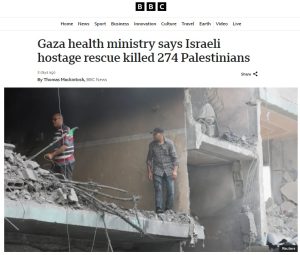
“But the latest figures from the Hamas-run health ministry in Gaza would, if confirmed, make it one of the deadliest days of the conflict so far.
People living in the densely-populated area have described the terror of coming under intense bombardment and heavy gunfire.
One man, Abdel Salam Darwish, told the BBC he was in a market buying vegetables when he heard fighter jets from above and the sound of gunfire.
“Afterwards, people’s bodies were in pieces, scattered in the streets, and blood stained the walls,” he said.”
“But there has been mounting criticism of the deadly cost of the operation inside Gaza, with European Union foreign affairs chief Josep Borrell saying he condemned it “in the strongest terms”.
“Reports from Gaza of another massacre of civilians are appalling,” he wrote on X.”
“Videos from Gaza taken in the aftermath of the raid show scenes of carnage.”
Lapham’s report – “Father of Israeli hostage died day before son’s rescue, relative says”- promotes the same framing, including a link to Mackintosh’s article.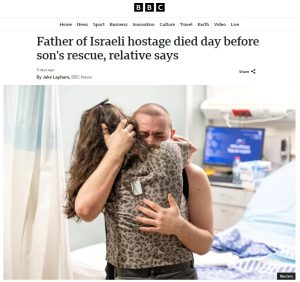
“But the humanitarian toll of the operation, which included a barrage of Israeli airstrikes, has sparked condemnation.
Gaza’s Hamas-run health ministry said 274 people were killed in the operation. If confirmed, it would make it one of the deadliest days in Gaza since the beginning of the conflict. […]
Qatar’s Prime Minister called for an intensification of global pressure on Israel to stop its “barbaric aggression” in Gaza, during a summit in Doha on Sunday.
The European Union’s top diplomat, Josep Borrell, condemned the killings as “another massacre of civilians“.”
Those unconfirmed casualty figures are also promoted in Bachega’s report – “Israel buoyed by hostage rescue – but way ahead still fraught” – along with a link to Mackintosh’s article.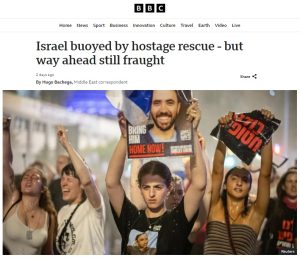
“Hamas meanwhile has called the operation, which its health ministry said killed more than 270 Palestinians, a “massacre”.
“The Israeli rescue in Gaza, which resulted in the death of one Israeli special forces officer, was considered a successful operation by Israel’s top authorities, despite the carnage in Nuseirat that has been largely ignored in Israel.”
One of the contributors to Bachega’s report is Gershon Baskin.
‘“Temporarily in Israel there will be more pressure from certain quarters on Netanyahu to not do any deal, that we should continue to do rescue operations,” Gershon Baskin, who helped negotiated a deal with Hamas for the release of captured Israeli soldier Gilad Shalit in 2011, said. “Anyone who thinks logically and rationally knows that the only way to get [the] hostages home is through a negotiated deal.”’
Bachega does not bother to inform his readers that the terms of the “negotiated deal” to free Gilad Shalit included the release of 1,027 prisoners collectively responsible for the murders of 569 Israelis, including Hamas’ Yahya Sinwar – one of the orchestrators of the October 7th atrocities which sparked the current war – and many others who returned to terrorist activities after their release. That information is obviously crucial for audience understanding of the claims put forward by Baskin and others in Bachega’s report.
Despite his experience last October of jumping to hasty conclusions based on Hamas claims, Jon Donnison’s report – “How Gaza hostage raid ended with Israel striking crowded streets” – also promotes unverified casualty figures supplied by that terrorist organisation: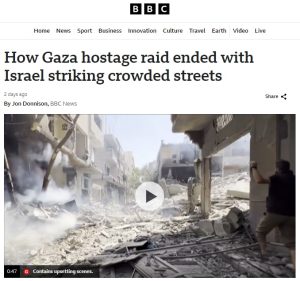
“The Hamas run health ministry says at least 274 Palestinians were killed and almost 700 injured in the assault.”
This report includes one sentence which is the sole opaque reference to the fact that Nuseirat is a UN administrated area in any of the BBC’s eight reports on the rescue:
“Sam Rose the Director of Planning at Unrwa, the UN agency for Palestinians, said many of his staff in the camp were caught up in the assault.”
Donnison’s report also includes the following:
“More is known about the family who the Israeli military says were holding the three men.
Ramy Abdu, the chairman of the Euro-Med Human Rights Monitor organisation, said initial evidence showed the Israeli special forces used a ladder to enter the family home of Dr Ahmed Al-Jamal.
His 36-year-old, son Abdullah al Jamal is a one-time freelance journalist who had also worked for Hamas as a spokesperson.
The special forces shot Ahmed and Abdullah dead along with several members of their family, Mr Abdu said.”
Donnison does not inform his readers that “the Euro-Med Human Rights Monitor organisation” – employees of which have been featured in BBC content since October 7th – is linked to Hamas. Donnison’s portrayal of Abdullah al Jamal as a “one-time freelance journalist” does not align with the Tweet put out by Ramy Abdu, who described him as “journalist Abdullah Al-Jamal”.
The latest of al Jamal’s contributions to the Palestine Chronicle (which began in 2019) appeared just one day before the rescue operation in Nuseirat – hardly “one-time” as asserted by Donnison.
After the IDF confirmed that three of the hostages had been held in al Jamal’s family home, the Palestine Chronicle tried to downplay its relationship with him and changed his bio on its website from “correspondent” to “contributor”. Donnison’s promotion of the term “freelance” would appear to have been sourced either from the Palestine Chronicle itself or from an inaccurate report published by CNN.
Given the BBC’s current reliance on freelance journalists in the Gaza Strip – and even taking into account the marked disinterest its journalists have shown to date regarding the exploitation of their profession by terrorist organisations – one might have expected Donnison to devote more than four sentences to the topic of a Hamas-linked journalist using his family and neighbours as human shields by holding hostages in a family home in a residential neighbourhood.
The report by David Gritten – “UN ‘shocked’ at Israeli hostage rescue’s impact on Gaza civilians” – manages to amplify the messaging of the notoriously anti-Israel UN human rights office while failing to clarify that the area in which the four hostages were held is under the control of the UN agency UNRWA.
“The UN human rights office says it is “profoundly shocked” at the impact on civilians of the Israeli operation in central Gaza that rescued four hostages held by Hamas. […]
UN spokesman Jeremy Laurence said the action by Israeli forces “seriously calls into question whether the principles of distinction, proportionality and precaution… were respected” and could amount to war crimes. […]
The four hostages freed on Saturday – Noa Argamani, Almog Meir, Andrey Kozlov and Shlomi Ziv – were held in two apartment buildings about 200m (656ft) apart in Nuseirat – a historic, urban refugee camp which has seen an influx of displaced people since the start of the war.”
Like his colleagues, Gritten promotes claims concerning casualties sourced from the terrorist organisation which held those hostages and started the war.
“Gaza’s Hamas-run health ministry said 274 Palestinians were killed and 698 others were injured during the operation. Its figures do not differentiate between civilians and combatants.
The Hamas-run Government Media Office reported that 64 children, 57 women and 37 elderly people were among the dead.”
As we see, the BBC produced no fewer than eight reports on this story in the space of four days, all of which devote more effort to promoting a chosen narrative about “carnage” and “massacre” than to providing BBC audiences with the full range of accurate and impartial information which would enhance their understanding of the simple fact that casualties – apparently including some civilians – occurred during a rescue operation because hostages were deliberately held in a civilian residential area by terrorists who attacked the rescue team.
Related Articles:
BEHIND THE BBC’S “PALESTINIAN JOURNALIST” LABEL

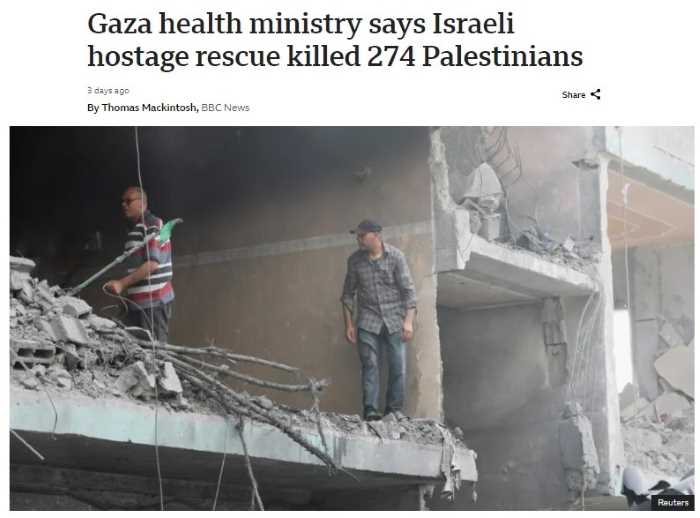
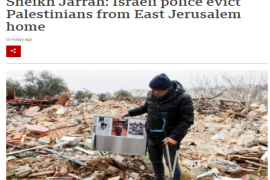
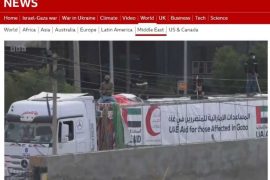
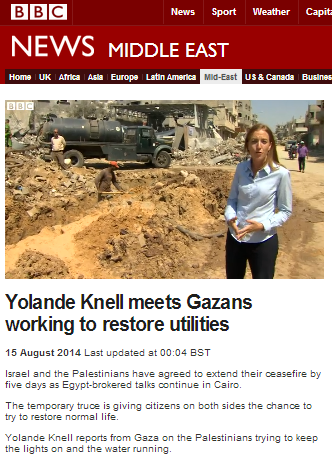

Yet the BBC coverage of Hezbollah attacks on Israel from Lebanon dont appear to be sufficient to warrant the BBC’s attention or coverage- one wonders why?
The BBC has hit a new low. Did it ever just parrot Nazi, Soviet, Saddam, Assad lies verbatim? Why is it so happy in bed with the butchers of Hamas?